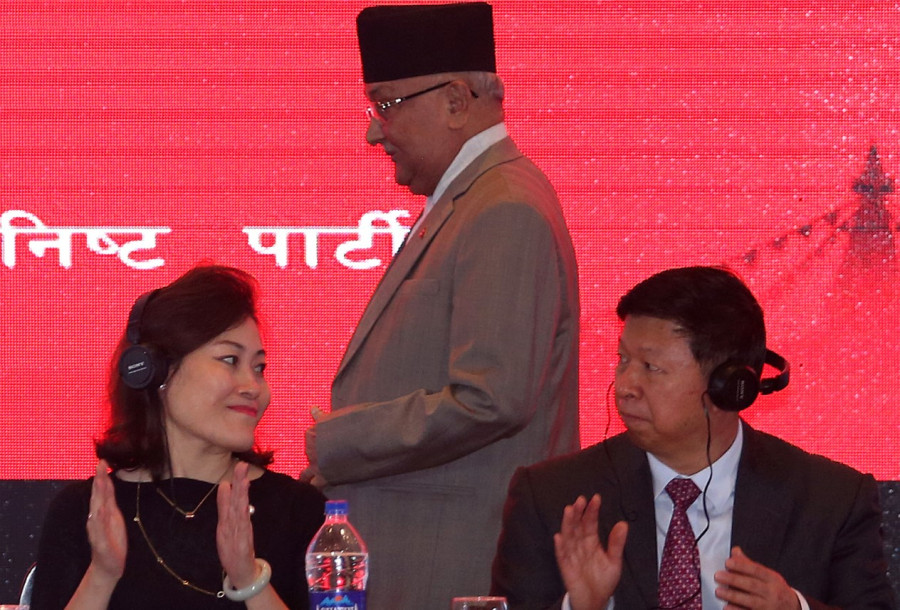National
Training programme on Xi Jinping Thought raises concern among opposition leaders
While some in the Nepali Congress see it as an attempt to curry favour with the Chinese, others are afraid of an ideological shift in the ruling party.
Anil Giri
The primary opposition party has raised concerns about the ruling Nepal Communist Party’s two-day training programme on Xi Jinping Thought, the current guiding doctrine of the Communist Party of China.
There are some fundamental differences between Nepali and Chinese societies, constitutions, political orientations and governing systems, said opposition Nepali Congress leaders at a book launch programme in the Capital on Monday.
“Our constitutional and political provisions are based on democracy, pluralism, federalism, an open society and parliamentary democracy, all of which are missing in the Chinese system,” Nepali Congress Vice-president Bimalendra Nidhi told the Post. “If they will train ruling party leaders and cadres to be like them, it is not acceptable to us.”
A Communist Party of China team arrived in Kathmandu on Monday to impart ‘training’ to senior leaders and cadres of the Nepal Communist Party in a programme titled ‘Nepal-China Friendship Symposium’.
At the inaugural speech, Ishwar Pokhrel, chief of the school department of the ruling party, said that although Nepal and China’s economic, social, political and geographical characteristics are different, the end goal is the same.
Over 50 Chinese leaders and cadres, led by Song Tao, head of Communist Party of China’s International Department, have arrived in Kathmandu. On Monday, Song met with Prime Minister KP Sharma Oli and assured that China would assist Nepal in its path to prosperity.
Chinese President Xi Jinping is considered the most powerful Chinese leader since Mao Zedong. Xi has maintained a tight hold on both the party and the government and even has the backing of the People’s Liberation Army. At its 19th National Conclave in 2017, the Communist Party of China incorporated Xi Jinping Thought on Socialism with Chinese Characteristics for a New Era, known in short as Xi Jinping Thought, into its constitution.
Xi’s “new era of Chinese socialism” has included flagship foreign policy initiative like the Belt and Road Initiative, of which Nepal is a part.
With Xi’s possible visit to Nepal next month, many believe that the Nepal Communist Party is simply currying favour with the northern neighbour with the training.
“When Indian Prime Minister Narendra Modi is visiting Nepal, Oli’s foreign policy becomes pro-Bharatiya Janata Party. When someone comes from China, suddenly it turns into pro-Communist Party of China,” said NP Saud, another Congress leader.
Others, however, are afraid of an ideological shift.
“Any nation can have friendly relations with any country but trying to impose a similar kind of political system or imparting training to indoctrinate is a matter of concern,” said Bal Krishna Khand, a Nepali Congress leader. “The way the ruling party is heading is a danger to Nepal’s sovereignty.”
Even a few political analysts have voiced concern over the joint training between the two communist parties.
“In Xi’s China, he is described as a ‘monarch’ and people’s mouths are shut in the name of socialism while rigid state-capitalism is exercised,” political commentator Khagendra Sangroula said on Twitter.
According to ruling party leaders, the Chinese team will present various papers in the two-day symposium, including on topics like ‘Completing the Building of a Comfortable Society’ and ‘Comprehensive Enforcement of Party Discipline’.
Leaders from both sides are expected to discuss a number of issues, including the Belt and Road Initiative. The training program is organised by the School Department of the ruling party.
At the end of the symposium, the two communist parties will also sign two memorandums of understanding pledging regular exchanges of leaders and cadres, including the holding of ideological symposiums and interactions, and pledging sisterly relations between the two parties.




 22.59°C Kathmandu
22.59°C Kathmandu















